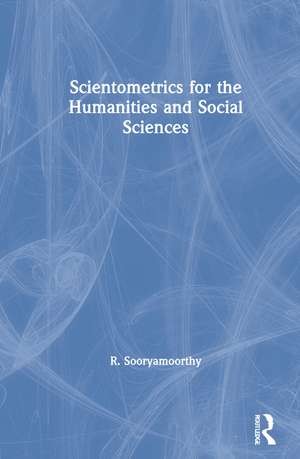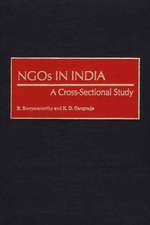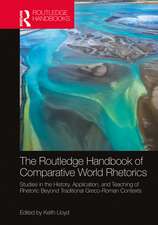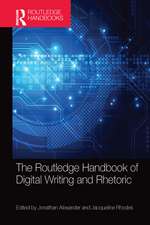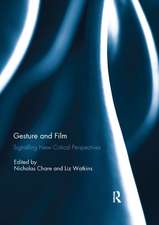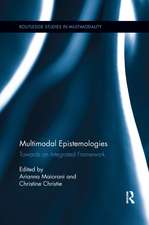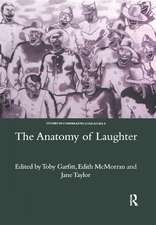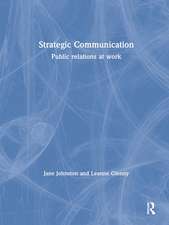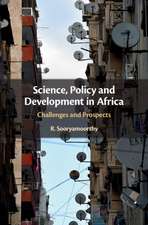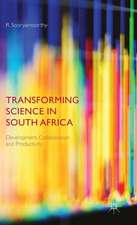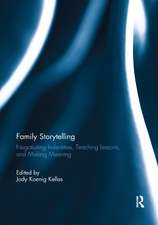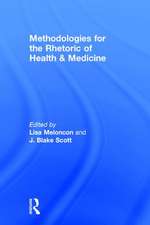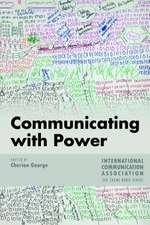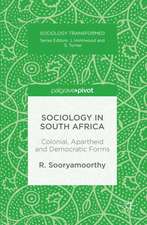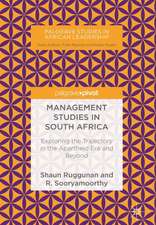Scientometrics for the Humanities and Social Sciences
Autor R. Sooryamoorthyen Limba Engleză Hardback – 9 noi 2020
This important book presents the inherent potential for data mining and analysis of qualitative data in scientometrics. The author provides select cases of scientometric studies in the humanities and social sciences, explaining their research objectives, sources of data and methodologies. It illustrates how data can be gathered not only from prominent online databases and repositories, but also from journals that are not stored in these databases. With the support of specific examples, the book shows how data on demographic variables can be collected to supplement scientometric data.
The book deals with a research methodology which has an increasing applicability not only to the study of science, but also to the study of the disciplines in the humanities and social sciences.
| Toate formatele și edițiile | Preț | Express |
|---|---|---|
| Paperback (1) | 382.18 lei 6-8 săpt. | |
| Taylor & Francis – 9 noi 2020 | 382.18 lei 6-8 săpt. | |
| Hardback (1) | 997.58 lei 6-8 săpt. | |
| Taylor & Francis – 9 noi 2020 | 997.58 lei 6-8 săpt. |
Preț: 997.58 lei
Preț vechi: 1216.57 lei
-18% Nou
Puncte Express: 1496
Preț estimativ în valută:
190.89€ • 207.100$ • 160.85£
190.89€ • 207.100$ • 160.85£
Carte tipărită la comandă
Livrare economică 23 aprilie-07 mai
Preluare comenzi: 021 569.72.76
Specificații
ISBN-13: 9780367626860
ISBN-10: 0367626861
Pagini: 170
Ilustrații: 9 Halftones, black and white; 9 Illustrations, black and white
Dimensiuni: 156 x 234 x 15 mm
Greutate: 0.38 kg
Ediția:1
Editura: Taylor & Francis
Colecția Routledge
Locul publicării:Oxford, United Kingdom
ISBN-10: 0367626861
Pagini: 170
Ilustrații: 9 Halftones, black and white; 9 Illustrations, black and white
Dimensiuni: 156 x 234 x 15 mm
Greutate: 0.38 kg
Ediția:1
Editura: Taylor & Francis
Colecția Routledge
Locul publicării:Oxford, United Kingdom
Public țintă
Postgraduate and ProfessionalCuprins
Preface
About the Book
About the Book
- Scientometrics: An Introduction
- Applications and Uses of Scientometrics
- Scientometrics in the Humanities and Social Sciences
- Cases of Scientometric Studies in the Humanities and Social Sciences
- Data: Sources, Processing and Analysis
Notă biografică
R. Sooryamoorthy is Professor of Sociology at the University of KwaZulu-Natal, South Africa. A scientist accredited to the National Research Foundation, he is the coauthor of Science in Participatory Development (1994) and author of Transforming Science in South Africa (2015) and Science, Policy and Development in Africa (2020).
Recenzii
"I am very impressed by the monograph Scientometrics for the Humanities and Social Sciences by R. Sooryamoorthy. It is the first monograph on Scientometrics I am aware of that is devoted exclusively to the use of scientometric techniques in the study of the humanities and social sciences. It aims to unfold the potential of these techniques to a wide audience. A most interesting and unique feature of the book is the well-designed presentation of a large number of cases illustrating both the methodology itself as well as its application in the study of the development of humanities and social sciences and its numerous subject fields, and in the assessment of research activity and performance. Most importantly, it dedicates attention not only to the potential of these techniques, but also to its limitations and pitfalls. This makes the monograph a valuable and useful piece of work, unmissable for librarians, research managers and policy makers, and researchers in the domain of humanities and social sciences who aim to enlarge their understanding of the uses and limits of scientometric techniques in these domains of science and scholarship." -- Henk F. Moed, Formerly at the Centre for Science and Technology Studies (CWTS), Leiden University, the Netherlands
"Scientometric analyses seem straightforward given the availability of apparently clear metrics (on production, citation and other operations of science). And indeed, measurement systems and underlying data collections are continually developing to cope with various difficulties they still face. But, whereas the use of such metrics works quite well for natural science, their application to the social sciences and even worse for the humanities is bedeviled by a further array of problems. Prof. Sooryamoorthy’s book takes us through such issues, placing them in historical context. This guide will be invaluable to neophyte analysts wishing to measure social science." -- Charles Crothers, Auckland University of Technology, New Zealand
"Scientometrics for the Humanities and Social Sciences provides a compendious overview of the origin of scientometrics and is a perfect collection of illustrative case studies that can guide social scientists to explore their own research fields." -- Valeria Aman, German Centre for Higher Education Research and Science Studies (DZHW), Germany
"The field of Scientometrics has cross disciplinary aetiology and relevance especially, within the fields of information systems, information science (particularly bibliometrics and informetrics), science policy, sociology, and other cognate sciences. Therefore, the criticality and potential use of this book in diverse disciplines cannot be underestimated. Furthermore, the increasing importance and the need to report accurately scientific and knowledge production as evidenced in the global ranking of universities that rely largely on scientometric techniques is yet another milestone this book has scaled. The field of Scientometrics is quite technical and only a few books are published in this area. The aspects on qualitative and quantitative methodologies and scenario-based examples used to illustrate phenomenon in the book are quite illuminating. The empirical approach of the book provides great validation of not just what is just said but also what is measured as well. The book is in addition well illustrated. This book should find favour with a wide range of scholars, businesses, professional societies, universities, national bibliographic systems, indexing and bibliometric systems. The knowledge economy in which the means of productions is dependent on knowledge production and how this can be measured is yet another milestone covered by the book. I wish to encourage academics from across different disciplines to read the book." -- Stephen Mutula, University of KwaZulu-Natal, South Africa
"The book will be very useful for researchers and students to understand scientometric tools and techniques. This is one of the very few books available globally to give an overall view of the subject. Hence, this is a highly recommended book for both basic and advanced level learners in the field for a holistic understanding of the subject." --SWAPAN KUMAR PATRA , Tshwane University of Technology Pretoria, South Africa
"Sooryamoorthy has delivered a unique book to guide HSS researchers in the application of the scientometric approach, a book which also paves the way for the future. The future could be one in which HSS scholars view collections of publications as rich sources of qualitative data for scientometric analysis in their respective disciplines." -Nelius Boshoff, Stellenbosch University, Stellenbosch, South Africa
"Sources, processing and analysis is a useful practical guide for all who intends to compile and process data for scientometric analysis-not only in the HSS area. A thorough and lucid summary of the scientometric craftsman's toolkit. In summary, the book seems completely fulfil its modest but rather salutary aim: the reviewer share the author's hopes formulated in the final sentence of the book: "It is [ ... ] hoped that this book will lead to renewed interest in scientometric research, particularly in the HSS " -András Schubert, Scientometrics (2021)
"Scientometric analyses seem straightforward given the availability of apparently clear metrics (on production, citation and other operations of science). And indeed, measurement systems and underlying data collections are continually developing to cope with various difficulties they still face. But, whereas the use of such metrics works quite well for natural science, their application to the social sciences and even worse for the humanities is bedeviled by a further array of problems. Prof. Sooryamoorthy’s book takes us through such issues, placing them in historical context. This guide will be invaluable to neophyte analysts wishing to measure social science." -- Charles Crothers, Auckland University of Technology, New Zealand
"Scientometrics for the Humanities and Social Sciences provides a compendious overview of the origin of scientometrics and is a perfect collection of illustrative case studies that can guide social scientists to explore their own research fields." -- Valeria Aman, German Centre for Higher Education Research and Science Studies (DZHW), Germany
"The field of Scientometrics has cross disciplinary aetiology and relevance especially, within the fields of information systems, information science (particularly bibliometrics and informetrics), science policy, sociology, and other cognate sciences. Therefore, the criticality and potential use of this book in diverse disciplines cannot be underestimated. Furthermore, the increasing importance and the need to report accurately scientific and knowledge production as evidenced in the global ranking of universities that rely largely on scientometric techniques is yet another milestone this book has scaled. The field of Scientometrics is quite technical and only a few books are published in this area. The aspects on qualitative and quantitative methodologies and scenario-based examples used to illustrate phenomenon in the book are quite illuminating. The empirical approach of the book provides great validation of not just what is just said but also what is measured as well. The book is in addition well illustrated. This book should find favour with a wide range of scholars, businesses, professional societies, universities, national bibliographic systems, indexing and bibliometric systems. The knowledge economy in which the means of productions is dependent on knowledge production and how this can be measured is yet another milestone covered by the book. I wish to encourage academics from across different disciplines to read the book." -- Stephen Mutula, University of KwaZulu-Natal, South Africa
"The book will be very useful for researchers and students to understand scientometric tools and techniques. This is one of the very few books available globally to give an overall view of the subject. Hence, this is a highly recommended book for both basic and advanced level learners in the field for a holistic understanding of the subject." --SWAPAN KUMAR PATRA , Tshwane University of Technology Pretoria, South Africa
"Sooryamoorthy has delivered a unique book to guide HSS researchers in the application of the scientometric approach, a book which also paves the way for the future. The future could be one in which HSS scholars view collections of publications as rich sources of qualitative data for scientometric analysis in their respective disciplines." -Nelius Boshoff, Stellenbosch University, Stellenbosch, South Africa
"Sources, processing and analysis is a useful practical guide for all who intends to compile and process data for scientometric analysis-not only in the HSS area. A thorough and lucid summary of the scientometric craftsman's toolkit. In summary, the book seems completely fulfil its modest but rather salutary aim: the reviewer share the author's hopes formulated in the final sentence of the book: "It is [ ... ] hoped that this book will lead to renewed interest in scientometric research, particularly in the HSS " -András Schubert, Scientometrics (2021)
Descriere
Scientometrics for the Humanities and Social Sciences is the first ever book on scientometrics that deals with the historical development of both quantitative and qualitative data analysis in scientometric studies. It focuses on its applicability in new and emerging areas of inquiry.
